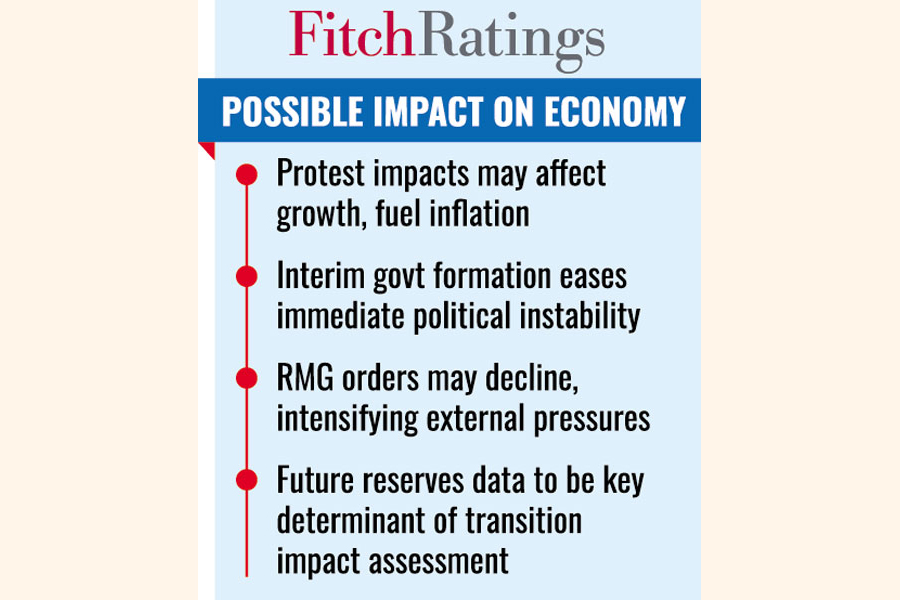
Published :
Updated :

Fitch Ratings said on Thursday that the fall of the Awami League government, following protests in July and August, raised uncertainty about the sovereign's credit profile.
"Downward pressure on Bangladesh's rating could increase if the political transition faces challenges, including prolonged political violence, or leads to policy paralysis and exacerbates fiscal or external stresses," says Fitch Ratings.
Fitch in May this year downgraded Bangladesh's rating to 'B+'/Stable from 'BB-'/Negative. This reflected a sustained weakening of the country's external buffers, leaving it more vulnerable to external shocks.
"We believed that this weakening would be challenging to reverse, despite reforms under an IMF-backed programme, including a shift towards greater exchange-rate flexibility," it said.
The ratings agency also said, "We believe the protests are likely to affect economic metrics in the current quarter, hurting growth and tax revenue collection, as well as pushing up consumer price inflation, which reached 11.7 per cent year-on-year in July 2024."
There is also likely to be an impact on readymade garment (RMG) exports and remittance inflows -- Bangladesh's two key sources of foreign earnings.
At this stage, Fitch Ratings assumed these effects would be temporary and that political stability would be restored and sustained.
The appointment of an interim government on 8 August appeared to have eased immediate political instability, but Bangladesh's society remains highly polarised and the longer-term political direction is uncertain.
A roughly 11 per cent recovery in the Dhaka Stock Exchange's DSEX Index between end-July and 13 August signalled moderate investor confidence in the interim administration, suggesting large-scale capital flight is a low risk for now.
However, Fitch said confidence could weaken if the ongoing transition does not proceed smoothly and adverse economic effects could mount. "The timing of prospective elections remains unclear. Deciding this, and subsequently holding elections, could raise political risk," Fitch Ratings said.
Furthermore, political gridlock remains a possibility following such elections, as a diverse range of political actors compete for power: the somewhat weakened Awami League, the Bangladesh Nationalist Party (BNP) as the other main party, the student movement that led the recent protests, the military and Islamist groups.
Another risk is that foreign firms could reduce RMG orders or shift sourcing to other markets, exacerbating external pressures.
Fitch Ratings stated in May that increased external vulnerability, for example, due to a sharp decline in foreign exchange reserves or other liquidity buffers, could lead to a negative rating action.
Reserves at the end of June, before the protests, stood at $21.8 billion, equivalent to an estimated four months of import cover. This is higher than the $18.4 billion in May when the rating assessment was completed.
Moreover, near-term debt repayment pressures should be moderate. The public sector's external debt service due in 2025 is approximately $4.3 billion, comprising $1.5 billion in bilateral debt and $2.2 billion owed to multilaterals.
"We expect financing from these official creditors to continue under our baseline, supporting external debt servicing capacity."
Nonetheless, according to the rating agency, future reserves data will be a key determinant of the ongoing political transition's impact on external liquidity strains.
If the interim or next government were to reverse the previous government's recent commitment to greater exchange-rate flexibility to shore up near-term macroeconomic stability, intervention to support the Taka could further deplete reserves, according to Fitch. However, the agency believes this risk is limited.
"We also assume that the interim government, as well as its successor, will adhere to the broad policy commitments under Bangladesh's IMF programme, but significant political instability or gridlock could complicate programme adherence."
Significant deviations from key programme targets, such as fiscal metrics and exchange-rate liberalisation, could jeopardise Bangladesh's access to IMF and other multilateral funding, further weakening its external position and increasing the risk of a negative sovereign rating action.
jasimharoon@yahoo.com


 For all latest news, follow The Financial Express Google News channel.
For all latest news, follow The Financial Express Google News channel.